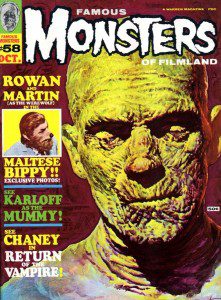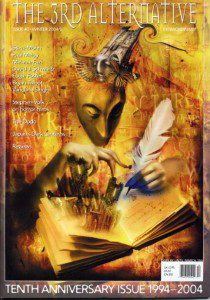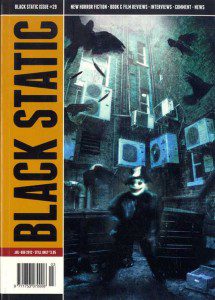We recently caught up with Peter Tennant, prolific author of horror, fantasy and speculative fiction and regular reviewer for the This Is Horror Magazine of the Year, Black Static.
You are a horror aficionado, where did your love for the genre stem from?
As a child, horror was in the air that I breathed, and looking back it all seems like such a heady mixture of images and ideas, memories that are both true and false, confused and confusing. We lived in a big old house with attics and a secret room containing nothing except a portrait of Queen Victoria: if my mother hadn’t been so pedantic about dusting, it would have fit right in on Mockingbird Heights. We even had the fabled brick shithouse at the end of the garden, which was something the Munsters never aspired to. There were grotesque stuffed animals in glass cases standing on the sideboard and a brass bowl with weird writing on it that an uncle had brought back from India, and family legend had it that he’d been followed the length and breadth of the sub-continent by saffron robed priests who wanted their holy object back. I never saw it, but I think the house had a ghost: one time I discovered a Ouija board in an upstairs cubby hole and my usually placid father went off on one, told me never to play with such things as they were dangerous. Courtesy of Aurora, I had a model of the Creature from the Black Lagoon taking pride of place on a shelf in my bedroom. When the stars were right it glowed in the dark.
 I visited the seaside, and while the rest of the family played bingo and attacked the slot machines I ran off for a go-round on the Ghost Train, nipped into the Chamber of Horrors at the Waxworks. I saved my pennies to purchase lurid comics shipped over from America that promised such frightful delights to an impressionable young mind. I collected monster bubble gum cards and those infamously bloody American Civil War cards, and sets portraying scenes from The Outer Limits TV show. On Friday nights when school was over I was allowed to stay up late and watch the Universal Monster movies with my father, only he’d often get tired and go up leaving me alone, and the minute he was gone I’d hop over into his big leather armchair, curl up in front of the dying embers of the fire and watch flickering images of mayhem and madness on the screen, go to bed and dream whatever nightmares might come. I cherished the one copy of Famous Monsters that I was able to get my hands on; it had the Mummy on the cover. I devoured Poe and James, and true ghost stories, and one time reading Lovecraft all on my own in our big old house I was convinced Cthulhu was coming to get me, and scared myself shitless, which was a serious issue indeed in the days of the brick shithouse. I watched The Addams Family, but preferred The Munsters. I had the hots for Lily before I even knew what the hots signified. I paid other kids sixpence a time to steal the latest Pan Book of Horror from the Woollies in town. It’s not something I’m proud of, but I didn’t have much money and was too scared to steal my own, and the former at least is still true today, so if I ever call round and after I leave you find one of your books missing…
I visited the seaside, and while the rest of the family played bingo and attacked the slot machines I ran off for a go-round on the Ghost Train, nipped into the Chamber of Horrors at the Waxworks. I saved my pennies to purchase lurid comics shipped over from America that promised such frightful delights to an impressionable young mind. I collected monster bubble gum cards and those infamously bloody American Civil War cards, and sets portraying scenes from The Outer Limits TV show. On Friday nights when school was over I was allowed to stay up late and watch the Universal Monster movies with my father, only he’d often get tired and go up leaving me alone, and the minute he was gone I’d hop over into his big leather armchair, curl up in front of the dying embers of the fire and watch flickering images of mayhem and madness on the screen, go to bed and dream whatever nightmares might come. I cherished the one copy of Famous Monsters that I was able to get my hands on; it had the Mummy on the cover. I devoured Poe and James, and true ghost stories, and one time reading Lovecraft all on my own in our big old house I was convinced Cthulhu was coming to get me, and scared myself shitless, which was a serious issue indeed in the days of the brick shithouse. I watched The Addams Family, but preferred The Munsters. I had the hots for Lily before I even knew what the hots signified. I paid other kids sixpence a time to steal the latest Pan Book of Horror from the Woollies in town. It’s not something I’m proud of, but I didn’t have much money and was too scared to steal my own, and the former at least is still true today, so if I ever call round and after I leave you find one of your books missing…
And when I first started writing stories of my own for school they were about a cursed Aztec knife that demanded blood sacrifice, a plague that turned people’s flesh to mush, a harp whose spectral owner materialised in the dead of night to play compositions by Erich Zann. In today’s climate I would probably have got sent to the school psychiatrist, but back then such behaviour in a young boy was regarded as perfectly normal, up to a point.
And besides, what the fuck else was I going to write about?
I pledged my troth to the Dark Goddess of Horror in a midnight ceremony at a crossroads and signed my soul away in week-old tomato relish.
But by now I was officially a teenager, and fickle as all my kind. With hormones raging I belatedly realised that, although she wasn’t exactly my type, the curvy blonde wrapped in tinfoil from Lost In Space had more potential as a subject for unrequited love than darling Lily, even if it didn’t amount to much other than the absence of an eight foot tall husband who’d beat someone like me to a pulp without even realising he’d done it. And so I deserted my pale bride and ran off with a floozy called Science Fiction, and for many years wandered the byways and highways of genre fiction at her side before finding the way back to my true love after dallying for a time with a city wide boy who answered to the name of Literature, but that’s a story for another day and another website.
Your Case Notes column is an integral part of Black Static, how did you get involved with the magazine?
Before Black Static TTA publisher Andy Cox used to produce a magazine titled The Third Alternative, and although it didn’t publish book reviews initially it did have a letter column, for readers to give feedback. I was one of the people who did that on a regular basis, and when Andy started up the small press review magazine Zene I was an obvious choice to write for it, and when he then decided to add book reviews to The Third Alternative itself I was an equally obvious choice for that. Most of my reviewing gigs, at least initially, were as the result of writing detailed letters of comment to various magazines, and editors concluding from those that I might be somebody who could write for them, though eventually the whole reviewing thing gained its own momentum.
 After a year or so being part of a team of book reviewers writing for The Third Alternative, Andy asked me if I’d be prepared to take on all the book reviewing duties, and as almost nothing gets me as excited as the prospect of free books I said yes, and when Black Static replaced The Third Alternative that situation carried on. I also started doing interviews to complement the reviews, and took on some other chores, such as sending copies of the reviews to publishers, responding to review requests etc. I’ve been working with Andy for a long time and he trusts me, and I think it’s fair to say that Case Notes is relatively autonomous – no pressure from above to review certain titles, interview particular authors. As long as I produce the required amount of copy for each issue, I’m pretty much left to decide for myself what that copy should be, though I do know the publisher has got my back if I get any crap from people. It’s a good arrangement and one I’m happy with.
After a year or so being part of a team of book reviewers writing for The Third Alternative, Andy asked me if I’d be prepared to take on all the book reviewing duties, and as almost nothing gets me as excited as the prospect of free books I said yes, and when Black Static replaced The Third Alternative that situation carried on. I also started doing interviews to complement the reviews, and took on some other chores, such as sending copies of the reviews to publishers, responding to review requests etc. I’ve been working with Andy for a long time and he trusts me, and I think it’s fair to say that Case Notes is relatively autonomous – no pressure from above to review certain titles, interview particular authors. As long as I produce the required amount of copy for each issue, I’m pretty much left to decide for myself what that copy should be, though I do know the publisher has got my back if I get any crap from people. It’s a good arrangement and one I’m happy with.
In one sense reviewing books is something that I’ve always done, or at least for the last forty years ever since my old English teacher encouraged us to write about the books we read – it seemed like a good habit to get into, especially for somebody with ambitions to write, and I’ve stuck with it ever since, one of the few habits that I developed in my teens and continue with as I fast approach sixty, at least that I can mention in public. I now have thousands of reviews in various notebooks, folders etc., detailing what I thought of each book at the time I read it, which is a good thing as I’m getting to the stage in my life where I don’t want to rely too much on memory. Adapting my ‘personal use’ reviews for publication in Black Static, or anywhere else, is simply a matter of reducing plot synopsis to the minimum necessary and expanding the bits where I discuss why I like something so that it can be understood by people who don’t have access to the inside of my head, then wrapping it all up in some fancy prose and possibly adding a bit of humour in the hope of getting an end product that’s entertaining as well as helpful for readers. It isn’t rocket science.
How has Black Static changed since you initially started your column and where do you think it will go next?
I think the magazine has a winning formula, with the right mix of provocative columnists, intelligent reviews and some of the best fiction in the genre, and as far as all that goes it’s pretty much the same magazine that it was when it launched five and a half years ago.
There have been some changes, as for instance with the White Noise news column which I used to write and we dropped a few issues back, in part because news can now be circulated so much faster via the internet and we wanted to use the space for other things, but also, being honest, I’d gotten tired of writing it. If I remember correctly, John Paul Catton used to write a column on Japanese culture for the magazine in its early days, and Mike O’Driscoll’s column now concerns itself with reviews of TV programmes within the genre.
 The main changes to the magazine though I’d say have been cosmetic. Andy Cox produces some of the most attractive publications on the market, and he’s never content to rest on his laurels, constantly tinkering with the magazine’s design in the endless effort to make it even more handsome. Initially David Gentry provided all the magazine’s artwork, but then after a few years of that other artists became involved, those who would fit well with Black Static’s aesthetic, so that the magazine retained its look in spite of the change. There was the experiment with colour for a few issues, and then a return to black and white illustrations, which to me seems more fitting to a horror magazine, at least one aimed at subtle thrills rather than the more garish delights that the genre has to offer. Most recently there’s been the change from A4 to the new, more compact size, with the intention to transform the magazine to something closer in appearance to a book, but retain the same visual appeal, with the chance for artwork to shine and the potential for further design innovation. The makeover appears to have been universally well received, and of course contingent with that change the page count has gone up to 96 from 64, plus wraparound covers, so even though the pages are somewhat smaller readers are getting more content for their money.
The main changes to the magazine though I’d say have been cosmetic. Andy Cox produces some of the most attractive publications on the market, and he’s never content to rest on his laurels, constantly tinkering with the magazine’s design in the endless effort to make it even more handsome. Initially David Gentry provided all the magazine’s artwork, but then after a few years of that other artists became involved, those who would fit well with Black Static’s aesthetic, so that the magazine retained its look in spite of the change. There was the experiment with colour for a few issues, and then a return to black and white illustrations, which to me seems more fitting to a horror magazine, at least one aimed at subtle thrills rather than the more garish delights that the genre has to offer. Most recently there’s been the change from A4 to the new, more compact size, with the intention to transform the magazine to something closer in appearance to a book, but retain the same visual appeal, with the chance for artwork to shine and the potential for further design innovation. The makeover appears to have been universally well received, and of course contingent with that change the page count has gone up to 96 from 64, plus wraparound covers, so even though the pages are somewhat smaller readers are getting more content for their money.
As to where it will go next, I really have no idea, other than that I think the electronic version of the magazine will become increasingly important, though never I hope to the extent that it will make the physical copy redundant. At least not until they can reproduce the distinctive Black Static smell on a Kindle. And of course with the electronic format there’s the possibility of producing a more interactive version of the magazine, one that’s specifically designed to be read from a screen instead of being a straightforward transfer from one medium to another, though that’s something to consider dependent on reader demand and whatever time and effort TTA can spare for such a project, so probably not going to happen any time soon.
One change that I’d like to see, and I know it’s a concern Andy shares, is the addition of a woman to the magazine’s line-up of columnists. I think Black Static has a good reputation as supportive of women writers within the genre, and certainly as far as the Case Notes section of the magazine goes I monitor what books I receive and what books I review so that women are proportionally represented. All we need now is a woman ‘on staff’ as it were, and that’s a shortcoming that definitely needs to be acknowledged and addressed. This isn’t about having a token female or positive discrimination, or any of the other dumb terms that get used in connection with the issue of gender representation. It is about making sure the magazine recognises the contribution of women to the horror genre and that they represent a significant part of our demographic, something that needs to be reflected in the complement of ‘staff’ writers.
An impending change, as already announced on the website and in the latest issue, is the introduction of Flux, a new and occasional magazine that will be given free to subscribers to Black Static and Interzone. While it won’t be exclusively horror, Flux will almost certainly contain material of interest to genre readers, its brief to publish those stories that fall between the cracks, the stories that get submitted to one of TTA’s publications, but which the editors don’t feel are quite right for Black Static etc., and yet are of such a quality that we most definitely want to publish them. Flux is the place where the strange things go.
DAN HOWARTH
—
If you enjoyed our interview with Peter and want to read Black Static Magazine, please consider clicking through to our Amazon Affiliate links and making a purchase today. If you do you’ll help keep the This Is Horror ship afloat with some very welcome remuneration.










